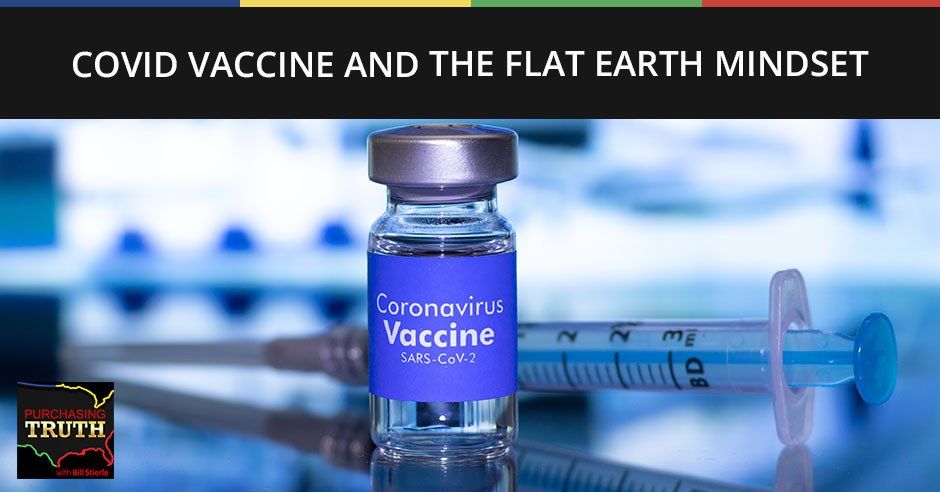COVID Vaccine And The Flat Earth Mindset
Subscribe Today!
The facts are unequivocal. There is now enough data to suggest that vaccinated people tend NOT to get sick, be hospitalized, or die from COVID-19. But if you’ve been following Purchasing Truth for some time, you would know that there is almost nothing facts can do to change beliefs. Despite the overwhelming evidence we now have, millions of Americans still have that flat earth mindset around COVID and the vaccine. While many beliefs are harmless, this one is far from it. It has serious implications on the nation’s ability to fully recover from the pandemic. What will it take for people to move away from their flat earth mindset and objectively confront the truth? What sort of authority can sway them to abandon their misguided beliefs born out of doubt and skepticism? Bill Stierle and Tom discuss.
---
Watch the episode here
I cannot get out of my mind the numbers that we talked about a little bit in our last episode of the people that are being hospitalized and dying from COVID-19. I can't get out of my head there's now enough data and facts, the truth around people that have been vaccinated and how they're not getting sick, going into the hospital and not dying. The numbers that are overwhelming and saying that the vast majority and in some cases, the entirety of people in the month of June 2021 who died of COVID-19, like for instance in the state of Maryland, all of them are un-vaccinated. Ninety-nine percent of people that are being hospitalized for COVID-19 are un-vaccinated yet we still have people not believing the virus is can impact them.
It's unsettling when we gather facts, information and data, there's a perspective in the world. We've talked about this and I've done a couple of shows on the flat Earth mindset. When a person stands on the Earth and walks around or turns around in a circle, they see the Earth is flat from their perspective. They see that is as true. It is true that their perception and worldview is that the entire Earth, from their perspective, is flat. As they raise up in an airplane, that doesn't help either because the world is bigger and it still looks flat. They could look out and see a slight curve and think to themselves, “Maybe there's something to this round Earth thing.” That's not what a belief does. A belief looks to validate what it's invested in.
When somebody is in a position of authority, when we hand over our consciousness to that authority, we'll tend to believe the authority person. People have given the authority to doctors and some of that has been true and helpful and some have not for different people. Some people have given the authority over to spiritual leaders, some of that has been good and some have not been so good. Somebody people have given up the authority over to the legal system, while some of that is good and some that's not. There's a bit of a round Earth that we need to walk or have a perspective that there are these different perceptions and perspectives that people go through.
How this relates to COVID-19 is important because if a political authority says, “It's not that bad. It's like the cold.” Somebody that is speaking from an authority like somebody that has a radio show and says, “It's not that big. It's like a cold, you're going to get over it. Most people don't die from it. It's not a big deal.” That authority and the authority that we've handed over to the person now has a little bit of trouble because we've handed truth over to someone else. If you've got enough of people to say it, this person of authority says, “By the way, that newscaster person also said it too, once.” They wouldn't allow people to lie on air, would they? Try not to laugh but that's the way some people think. If a person is of status that is higher than them, they will lean or hand authority over to them, which is why the flat Earth mindset and COVID-19 are having a little bit of a dance with themselves. They're dancing together and like, “We may want to look at this at a bigger picture and see what the real thing is.”
Like you zeroed in at the start of the show, in the month of June, these people that were unvaccinated or were the only ones in the hospital, that experience of truth when a flat Earth person says, “There must be some mistake. This is not right because I don't see it that way. The person must be lying.” How did it get to that person's lying when you're the person that's casting the belief in the person's direction? You may be wondering what keeps a lie in place. The thing that keeps somebody's version of the truth that people would call a lie is the molecules that are associated with doubt, skepticism and anger. Those are the ones that keep a belief or a worldview in place. “I'm angry about this. I'm doubtful about this. I'm skeptical about this. I'm not moving off my belief.” We've talked about some different articles but you've also had some other data’s that were interesting. How do you cross that? How do you get the person off the flat Earth mindset that they're sitting with?
You and I have sat on this show many times, there are times when the facts don't matter. We've also talked about how it only takes 51% of a belief to push you over the edge to believing something. It doesn't have to be fully true but here we are with data from the month of June. We're talking from Coast-to-Coast here. Maryland's numbers have been highlighted but even in California, the most populous state, which has twenty million fully vaccinated people in the state, a very infinitesimally small percentage of people that have been vaccinated have been hospitalized with COVID-19. It is such a couple zero fraction of a percent. Compared to the number of people that have died, how many of them have been un-vaccinated versus vaccinated? It is overwhelming. The meter is 99%.
I'm not even citing the facts here because I know the facts don't matter to some people that have doubt and skepticism but we have real numbers. I'll give you one. The CDC has tracked so-called breakthrough cases, which a vaccinated person is hospitalized or dies from COVID-19 and you can say, “They have skewed numbers.” Maybe but they've tallied 879 deaths among vaccinated people, which is a tiny fraction of the more than 600,000 Americans who have died of Coronavirus. I can hear some skeptics out there saying, “Those 600,000 people, a lot of them died before we had a vaccine available.” Nobody was vaccinated back in 2020 at some point but let's take us to the end of 2020, take us to 400,000 people who have died. Even if you take 200,000 people and you have 879 that died who were vaccinated, it's still an infinitesimally small percentage. There's my fact and I'll get off of the fact train there for a minute.
It's a good point because the damage is to truth and trust. The damage is how can I get trust and how can I get the truth so I can make a decision? The feeling of doubt or skepticism in splitting numbers is not talking about the issue. The primary issue is how do you meet the need for protection and safety for people. You figure that would be good to be at the top of the list. Second, how do you provide protection for jobs in an economy where people are more engaged rather than less engaged in the world? We've got a COVID-19 PTSD thing that's showing up that we're not doing anything about, which is, “I don't want to go back to work. I don't want to drive in a car. I want to stay at home at work. I work fine here. The paycheck came the same as it did before. Why do I need to go and sit in an office? I don't like those people in the office anyway. Why am I going in there?”
The protection, the trauma of the potential of being out there. “By the way, I know my boss and he's this way. I don't want to go because he's not a vaccinated type of guy. In fact, he's a person that, as a Republican, voted for Donald Trump. Whatever things that they're saying that when we look at a post-trauma event, you're taking a set of beliefs that used to work one way and now they've worked another way. It's hard to snap them back into reality. It’s hard to snap the belief and behavior back. I got an email from my former office that I rented office space at. “We want you back.” I'm thinking like, “Why go back?” I know you're there. I might rent the room every once in a while but I'm surely not going to put my address there again because I don't need to. Working from home is not a bad or wrong thing to do, the belief shift is going like, “If you can work at home, just work at home. Workspace, home space, you don't have to travel, you got more connection time with your family.” What happened is all of a sudden, I started pitching the belief.
It's very obvious that that belief has shifted in America from the past. I started working at home in 1993. I did have a couple of stints working for other people after that but I remember my own company, 1997, 1998, 1999 into the early 2000s. Before my company needed a physical office space, I was run out of my home, even some employees coming into the home and the number of people that thought I didn't have a real business because I worked in my home. It was interesting. It's like, “We're making $2 million a year here.” It's not a real business because they don't have an office. I don't know. you bring up a good point though. I have a question for you. For people that have this flat Earth mindset about the vaccine for whatever reason, is there any authority that can get through to them? Is there any level of authority that they will heed or listen to?
There is but the order for that authority to get through now, they need empathy for the doubt and skepticism that they're carrying. Like, “It won't work now if Donald Trump comes out and says, “I lost my best friend or I lost one of my family members to COVID. Please go get vaccinated because this is a great loss to me.” That's what it took for Ronald Reagan to do something about AIDS was his close friend Rock Hudson died. He's like, “I'm in a position. I can do something with it.” Forget the optics. “I am now going to take an action step in that direction.” That helped him greatly to be engendered by things. Would it have made a difference if he would have made that decision a year earlier? Yes. My brother might even be alive if you would've made that decision earlier because all of a sudden, it would be national advocacy for an acceptance of, protection of, in research tours.
It's all the goodwill that Joe Biden’s receiving now that he's handling it and he's going like, “This is the way we're going, this is what's working and I'm following the numbers here.” Restoring and getting them to believe it is an authority saying in the past. You might've been feeling doubtful and skeptical or you've been filled doubtful because you've struggled with the truth. You might've felt skeptical because it's been very hard to trust. If that authority said this sentence, “What can I say or do so trust would take place between us?”
That person that's on the flat Earth mindset about COVID would say, “Trust would say if my family doctor said this. Trust would be if my neighbor said this. Trust would be if I read this paper.” They would bring themselves to the decision because now, somebody is talking about the pain that they're experiencing with the feeling of doubt and skepticism. Down skepticism is hard to maintain. It takes a lot of adrenaline and cortisol to do. I'll do it now. “I don't know if that's going to take place. I don't think it's going to happen.” Even as me doing it, my body pulled straight back.
I could imagine if former President Donald Trump would go public saying, “I know a lot of people had doubt and skepticism over these vaccines because they were developed so quickly and every other vaccine that has been out there has taken years to develop. The operation warp speed, this thing got done in less than a year.”
“I appreciate that my administration was able to remove the red tape and the redundancy so that we can produce a safe vaccine in the shortest time possible.” That's what he would say.
Can you imagine before Donald Trump left the office had labeled this vaccine, “The Donald Trump vaccine,” and took some credit for it? Plus, if it was named for him, he'd be all over supporting it and a lot more people would inherently trust it.
The need for respect and recognition is clearly at the front of the list. His need for being seen, heard, staying relevant, connection are needs that he follows. It’s like chumming the water is you're fishing, you're throwing a piece of bait out there, “They're coming.” A person comes. Here's something that's interesting. All the newscasters on the left, if they would empathize with him and push credit recognition and acknowledgment in the way that I did it, more people would get vaccinated and we wouldn't even need a message out of him.
They could do it for him.
They could surrogate empathy for him in order to get them to move.
Wouldn't it be interesting if the media, the reporters on the left did it and they're giving empathy, compassion, praise, even to the former president for whatever he did to contribute to this? Wouldn't the right media at Fox News, Newsmax and OAN need to follow through, wouldn't they need to amplify that?
It gives them the right and off-ramp. I was at a branding marketing meeting and I told the entire group. I go, “You cannot answer the person's question on your display. You've got to provide curiosity and anticipation on the display. Do not get the display to answer their question or otherwise they'll read it and move on. We don't want them to read it and move on. We want them to come in and have a conversation with you.” It's the same thing with the vaccine, we want people to have the experience and imagine what it is like when your body calms down and doesn't need to fight doubt and skepticism.
Think about that. Even if somebody starts creating a meme on social media that, “Thanks to former President Donald Trump for doing this and creating the vaccine or fostering it, allowing it to be created and approved so fast.” That would be one of those little messages that is going to chip away at that doubt and skepticism. “Donald Trump is responsible? “Yes, he is.” “Maybe I want to reconsider that vaccine.” It occurs to me so many people are placing a high level of trust and authority in messages they see on social media because they're in alignment with their beliefs.
Authority can change to be authoritarian when the person steps across the line and grabs respect and recognition. When more pushing authority, the line is, “Here's where the authority comes up to and here's where authoritarianism is on this other side of the line. Now, every message is true from authoritarianism, not this message is important for the country,” and that's when a clean authority messaging looks like. It’s really important.
It's always been that way. A lot of people blame social media for propagating messages and further dividing us. Maybe it has amplified messages because of modern technology.
Siloed messages too. It's one of those things that the algorithms are not bringing in or not rolling through.
In reality, we've always had in the United States, newspapers, magazines, things that do that. Something you said reminded me of one of my favorite movies. I know you know this movie as well, it's called Tucker: The Man and His Dream about Preston Thomas Tucker who created the Tucker automobile in the late 1940s. If you don't know it, should check out that movie. There's this interesting scene based on true events where he had this idea for a car and he's faced all sorts of obstacles in the way of creating it because he was very little and what he wanted to do was a threat to the established auto industry. He had a friend at a magazine and he got an advertorial place there, meaning it wasn't an advertisement, it was more somewhere between an article and an advertisement about this car.
There's this funny scene where a couple of investors who were considering investing in Tucker said, “If he's going to do it, it's going to cost a lot of money because you need to have a complete car, a full working prototype.” The other guy says, “It says so in the magazine.” Therefore, the prototype of the car must exist. The funny part of it is the car was an idea on paper and had not existed at that time but because it said so in the magazine, this level of authority was placed on the magazine as an arbiter of truth in some ways. It was believed by the readers that this already existed. Social media plays that role in many ways.
That's what you and I are embracing on this show. What are the activities that a person does to engender truth to move in their direction rather integritous or not? That's not what the issue is. The issue is can the message be grabbed on by the reader and therefore truth is purchased and moves in their direction a little bit. There's another moment that purchases truth back in the other direction. Until you're staring at what needs you're going for, it's very challenging to have a good beat and a good perspective of truth because if you can't argue both sides then you're not looking for truth and you're not able to do it. I can sit here and argue both sides. I can argue the good reasons why XYZ takes place because the numbers are there.
Kevin McCarthy is working the numbers. He has the belief and some validation that, “I can stay on this line and win these seats, therefore I can secure XYZ.” The other side's got to think on that side. They might have is anger because anger is going to block them from being clearheaded about what's happening and going like, “It's interesting. I guess he has the belief.” I'm going to pretend to pick one of them.
Who are you trying to pretend you are, on the right or the left?
On the left. Pick one of them.
It could be Rachel Maddow.
Rachel Maddow’s not so hard. She’s is like, “It's interesting to see what Kevin McCarthy is going to do by following this narrative of promoting.” He feels confident that he has enough votes on this issue to keep languaging things that way. Rachel Maddow doesn't do it. She does outrage. She doesn't do empathy. She does sympathy, understanding but she doesn't do empathy because empathy flattens dopamine, it reduces the conflict so she won't sound like an enemy but she does. It sounds like a whining empathy. “You won't believe what happened.” I appreciate the form of truth and her followers get worked up in the same way. “Come back. After the break, we're going to do this.” It's like, “I’m tired. I've got other things to spend my adrenaline and cortisol on.” The outrage has a reality to it. I'm not saying that it's all that bad, it's just enlisting somebody away from healing or progress and that's something important to watch out for.
It's very interesting when you break these things down to understand what media is accomplishing or trying to accomplish and what they're not necessarily trying to accomplish somewhat can be disheartening or disappointing sometimes too.
It’s a languaging show. This is about what to say in order to get it to go one way or another way. If I'm advising one group of people, it's different than advising another group. I've got to find out where the greatest pain is and work from that position because wherever the greatest pain is, it’s what you want to work on because it's disheartening that certain group of Americans that think they would like their vote to be counted more than other groups of Americans. That's what they're believing or not believing the equal, “Let's make an accessible ability across the board.” That's a huge change. We've done this cycle before. There's a cycle in which voter suppression was prominent. Now, we're getting in our 2021 version of suppression and exclusion in order to meet the need for protection. There's more to talk about this. The big thing to pull away from now is getting used to how quickly we can get off the flat Earth mindset, see the big picture of it and see if we can stick the landing on that.
That's very much needed in order for the nation to achieve a certain level of safety and protection from the virus.
Restore truth and trust throughout things. It doesn't mean that people aren't going to do junky things in government or out of government. It just means we've got to do a better job of pursuing truth and trust with ourselves, with others and it will go better.
Bill, thanks so much. I appreciate this discussion.
Thanks.
Love the show? Subscribe, rate, review, and share!







